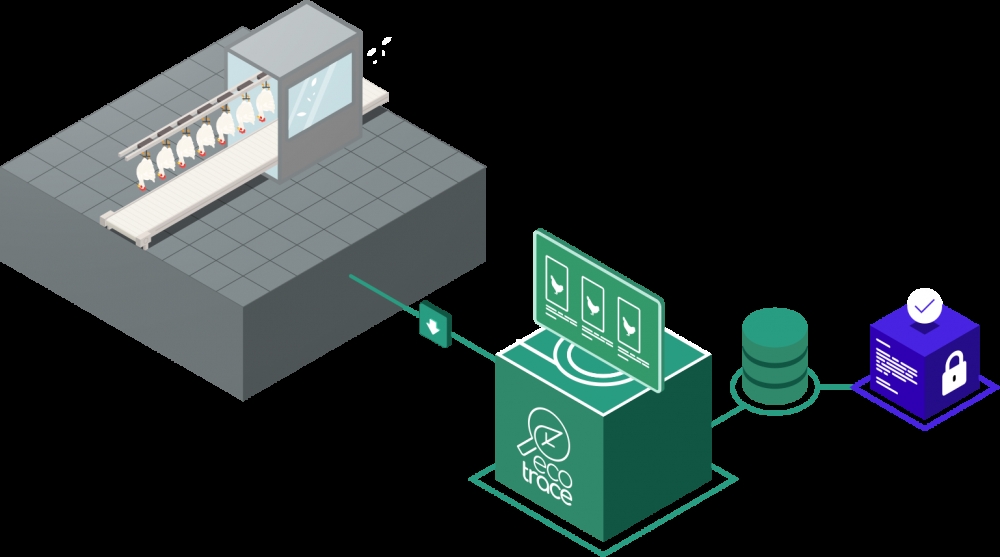


Illustration: Ecotrace
Published on 03/18/2024
By Roseli Andrion | Agência FAPESP – A system using artificial intelligence and computer vision has been created in Brazil to help the poultry processing industry detect carcass lesions in real time as part of quality management. The creator is Ecotrace, a startup founded six years ago. It began with a system to assess beef carcasses and recently saw an opportunity to extend the scope of its technology.
According to researchers on the staff of the firm, which is based at Vinhedo in São Paulo state, Brazil, a system of this kind is more accurate than the human eyes that usually carry out the activity in question. “Even when the eyes belong to trained professionals, divergence may occur,” said Carolina Coutinho, head of research and development (R&D) at Ecotrace and responsible for the project, which is supported by FAPESP’s Innovative Research in Small Business Program (PIPE). “The product has been very well accepted by the beef industry,” she added.
Inspired by the success of that solution, Ecotrace decided to do a test with a simple version for detecting external lesions, referred to as a minimum viable product, or MVP. “We wanted to find out whether the tool made sense to the industry. The results pointed to 80% accuracy with a small image sample,” Coutinho said.
The team then set out to see if this type of system would be useful to poultry processing companies. “We concluded that it would, not least because inspection of a production line requires many professionals. There are lines that process 12,000 chickens per hour, and a grader may have to assess a chicken every two seconds. That’s extremely fast. It’s humanly impossible even for the very well-trained. There comes a time when your eyesight gets blurred,” she said.
The conventional process entails inspection of samples, whereas 100% of the units on a production line can be verified using the startup’s solution. “If 150,000 chickens are slaughtered, it will inspect all 150,000, tell the user if there are lesions and, if so, identify them. We plan to optimize the process so that the industry can assess losses and pinpoint opportunities for improvement,” she said.
Besides external lesions, the system also detects contamination, which is actually the industry’s number one concern, according to Coutinho. “There are regulatory standards that require quantification of contaminations. Our solution detects them if they exist, quantifies them, and distinguishes them in terms of fecal, gastric and biliary. This is one of the primary aspects of the tool and can help the industry implement automated control programs, followed later by inspection modernization,” she said.
Unique and portable
To ensure that the technology used by the startup is always the most advanced, two professionals with PhDs are responsible for all aspects of the solution’s artificial intelligence. The firm has a total staff of seven working on development and enhancement of the solution.
The system is unique in Brazil. There are solutions that do the same work in other countries, but they involve large, expensive machines, according to Coutinho. “They’re also hard to implement in the industrial environment. Our system consists of a small camera, two 60 cm light bulbs, and a stand. We’ve made it as compact as possible so that it can be adapted to companies of all sizes, small and large,” she said.
Another key feature of the startup’s solution is that it can be configured to meet all the user’s needs, unlike the usual large-scale gear with inflexible specifications. “We researched the industry’s needs and tailored the product to its key requirements,” said Maria Paula Castro, Ecotrace’s chief operating officer.
The solution is currently being validated in partner companies. According to Coutinho, its accuracy ranges from 85% to 97% depending on the type of lesion. “We’re collecting all the data we can so as to validate execution of the system in real time. We mean to test it in small and large companies because the environments and lines are different,” she said.
This type of solution can assist decision-making by meat packing companies with regard to real-time improvements to processes. “If the artificial intelligence detects a rise in wing fractures, for example, the equipment can be adjusted in real time so as to reduce these occurrences. Losses are cut and productivity improves,” she said.
According to Castro, the system can be used in other industrial activities. “We’ve been asked to implement the system in the pork industry. We use the same know-how to identify ticks in hides. Nothing prevents application of the concept in other areas. We’ve sold the solution for beef processing to customers in Paraguay and Argentina. We’d like to follow this same path with poultry,” she said.
For the industry, using the system can cut costs by enabling automatic inspection of production lines. More accurate control reduces both operational impacts and economic losses. “There are also users who focus on process optimization to reallocate personnel to other activities,” Coutinho said.
Traceability required
The food industry is required by law to comply with traceability protocols designed to ensure that any animals involved do not inhabit deforested areas, among other things. Ecotrace’s system helps users guarantee full compliance with these protocols by digitizing photographs, documents and all other relevant data for every carcass. The data collected by the platform enhances the governance of meat-packing companies. The solution also contributes to food safety by assuring highly accurate inspection of production lines.
Source: https://agencia.fapesp.br/51125